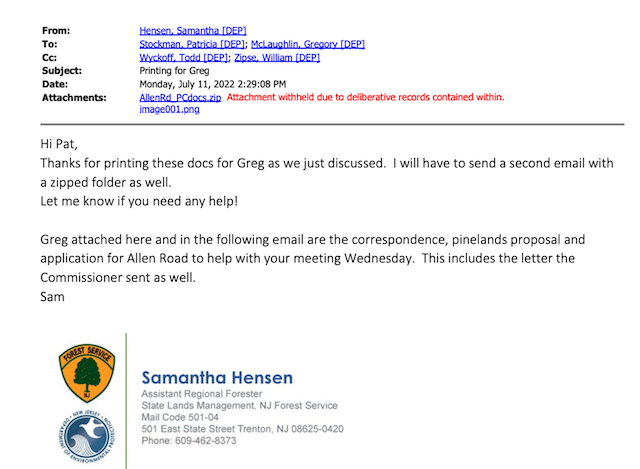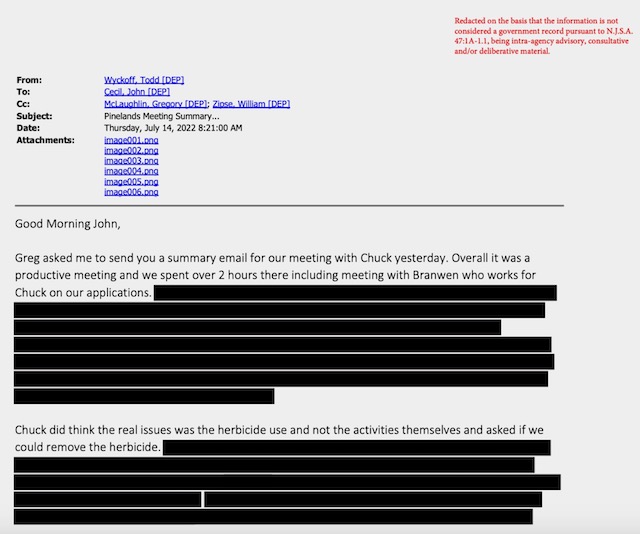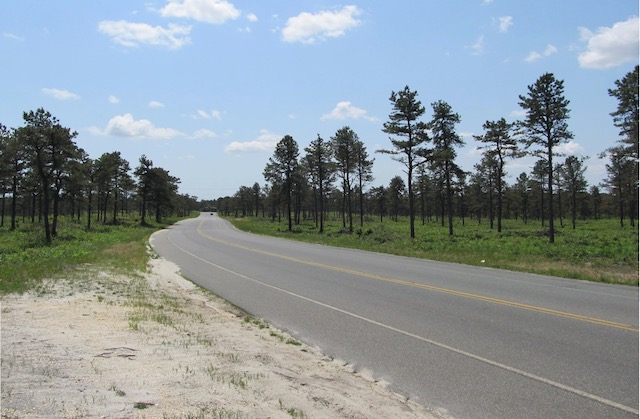DEP Redacts And Denies Documents – Including Commissioner’s Letter
DEP Claims Secret Government Meetings Exempt From OPRA
Assistant Commissioner Cecil Directly Involved, Despite Gross Conflicts Of Interest
On August 9, immediately after learning of the DEP’s proposed logging plan, I filed an OPRA public records request to the Pinelands Commission for the documents.
Incredibly, the Pinelands Commission denied that request on the basis that they had “no responsive records”.
So on October 13, I submitted exactly the same OPRA public records request to DEP for the documents regarding the DEP Pinelands logging plan.
Today, DEP responded. (complete DEP response provided via email upon request)
DEP’s response is revealing and deeply disturbing.
First of all, DEP emails reveal that DEP Commissioner LaTourette was personally involved in the DEP logging plan. LaTourette wrote a letter to the Pinelands Commission urging them to approve DEP’s plan.
It is highly unusual – and I believe improper – for a DEP Commissioner to get involved in an independent Commission’s regulatory review of a DEP application.
I guess Commissioner LaTourette honed those skills on securing regulatory approvals in his prior job as a corporate lawyer.
Clearly, the Commissioner was seeking to influence the Commission and was applying political pressure for their approval.
Given his prior exaggeration of wildfire risks, we can only imagine the spin he crafted to support the DEP logging plan. (the DEP as been spinning wildfire risks for a long time, yet DEP refuses to even consider restrictions on new development in designated extreme wildfire risk areas or to mandate retrofit fireproofing of existing development. Instead, they promote logging (“thinning”) to “manage” wildfire).
Worse, the DEP OPRA response did not provide Commissioner LaTourette’s letter and did not even specifically identify the letter as being denied (several years ago, DEP used to specifically identify all withheld documents in what is known as an OPRA “privilege log”).
I had to discover the existence of the Commissioner’s letter by reading staff emails and noting the letter as an attachment (see above photo). In a July 11, 2022 memo – just 2 days before the critically important meeting with Pinelands staff – a DEP staffer wrote of and attached the letter:
This includes the letter the Commissioner sent as well.
The DEP categorically indirectly denied the Commissioner’s letter on the basis that it was “deliberative” and exempt under OPRA.
It is impossible for the Commissioner’s letter to be “deliberative” because both DEP and the Pinelands Commission’s “deliberations” are over: the Pinelands Commission approved the DEP plan and DEP’s “deliberations” ended when they submitted the Plan to the Pinelands Commission and then modified it.
There were no “deliberations” underway when I filed my OPRA request.
DEP’s denial of Commissioner LaTourette’s letter is clearly an abuse of OPRA and intend to shield the Commissioner from public criticism and subvert transparency and undermine accountability.
It is designed to thwart and undermine arguments to the Gov. to veto the minutes of the Pinelands Commission and block the DEP plan.
Second, the DEP emails show that Assistant Commissioner Cecil was involved in the DEP plan and Pinelands Commission review of it, despite his gross conflicts of interest, i.e. see this heavily redacted July 14, 2022 memo to Cecil, briefing him on the Pinelands Commission July 13 staff meeting:
I previously filed a complaint to the State Ethics Commission, in which I included Cecil’s Pinelands presentation.
Last spring, just before he joined DEP, Cecil made a forestry presentation to the Pinelands Commission, see:
In that Cecil presentation, he included this photo of a “thinned” forest he was advocating for:
Accordingly, Cecil has a conflict of interest under State ethics law, which provides:
a state official must recuse from an official matter if he or she had involvement in that matter, other than on behalf of the State, prior to commencement of State service.
Therefore, Cecil was required to recuse from any DEP involvement in forestry in the Pinelands that he was directly responsible for before he joined DEP.
The fact that he was involved in this DEP logging plan is outrageous.
Third, the DEP claims that meetings between the staffs of government agencies on pending public applications are exempt from OPRA. DEP wrote this (DEP original in red ink):
Redacted on the basis that OPRA exempts from disclosure information regarding non-public meetings conducted by public officials. See Gannett N.J. Partners, LP v. Cty. of Middlesex, 379 N.J. Super. 205, 217-18 (2005); N. Jersey Newspapers Co. v. Passaic Cty. Bd. of Chosen Freeholders, 127 N.J. 9, 17 (1992). O’Shea v. W. Milford Bd. of Educ., 391 N.J. Super. 534, 538-39 (App. Div. 2007).
This means that government can have secret meetings.
This is a gross abuse, and if legally valid – I have not read the case law cited – it is a huge loophole in OPRA that must be closed by the legislature. (more forthcoming on that)
Fourth, the response today provided the DEP forestry application to the Commission.
My first reading of that application today forces me to revise prior posts, which were made based on the Pinelands Commission’s public deliberations and the text of their approval document (which I excerpted at length), not review of the actual DEP application which I received today.
I will do that in a subsequent post, and will merely note here today that DEP did in fact attempt to address the carbon implications of the logging, but how they did so is superficial and seriously flawed and the fact that it was approved by the Commission is troubling.
[End Note: take another look at the logo on the bottom left of the above DEP Forest Service Memo.
The logo puts the Forest Service ABOVE the DEP – that pretty much visually reveals the hierarchy and who they think is in charge.




Pingback: WolfeNotes.com » Conservationists Walk Back The Lies They Told To Defend Their Support of DEP’s Pinelands Logging Plan
Pingback: WolfeNotes.com » Murphy DEP Rammed Through Controversial Pinelands Logging Plan To Evade Pending “No Net Loss” Of Trees Policy
Pingback: WolfeNotes.com » ORWELL: Conservationists Conduct Tour To Promote DEP Logging Of Pinelands Forests
Pingback: WolfeNotes.com » Murphy DEP Commissioner LaTourette Twisted Arms At The Pinelands Commission To Gain Approval Of Deeply Flawed Logging Plan